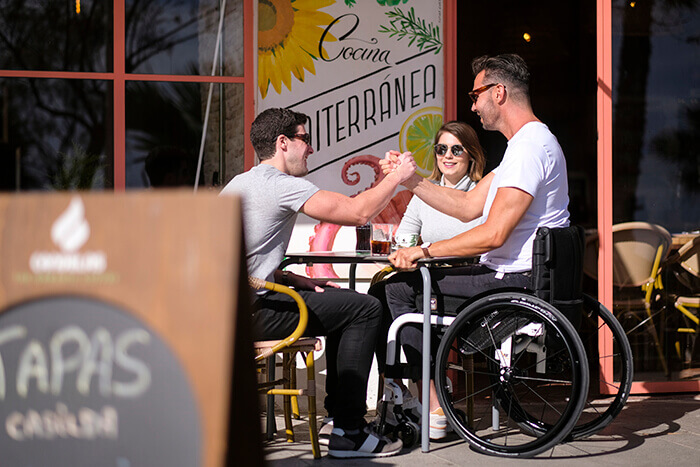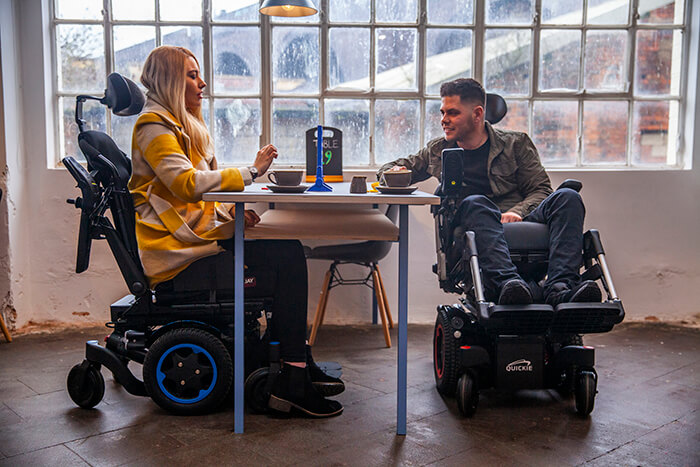Share:
Take it offline!
This Education in Motion resource is also available as a printable PDF.
Download PDF
Although we are breaking down more and more barriers to become an accessible and inclusive society, people with disabilities continue to face many challenges in their day-to-day lives. Some are related to discrimination and the environment, but, other times, the difficulties derive from the bad image they have of themselves.
This situation can negatively influence your emotional well-being and even condition your personal development. For this reason, working on self-esteem with people with disabilities is key to helping them respect and love themselves as they are.
The importance of working on self-esteem
Throughout our lives, and based on our experiences, we develop an image about ourselves. What we know as self-esteem is nothing more than having a positive attitude towards oneself.

Why is self-esteem so important?
When our self-image is positive, we see our environment as a safe space with which we can interact. In addition, we are more sociable and face our goals and objectives with a better attitude and greater resources. If, on the contrary, we have a negative or undervalued image of ourselves, we are more insecure and what surrounds us, even small daily actions, can become "dangerous", conditioning all aspects of our life.
In this sense, all of us must work on our self-esteem. However, for people with disabilities, this work is twofold, since, many times, the different circumstances they face (negative social experiences, prejudices, lack of support, communication and / or expression problems) can cause frustration, introversion and isolation.
In addition, many people with disabilities adopt and replicate these attitudes as patterns, which translate into negative behaviors.
In other cases, dependency situations show a vulnerability that can lead to low self-esteem and, as a consequence, to the appearance of self-destructive attitudes. Some people with a certain degree of dependency even end up believing that they cannot do anything and therefore do not try either. This inactivity, in turn, causes them greater isolation and loneliness.
On the other hand, complexes (inferiority, fear ...) tend to be more common in people with disabilities. It is true that complexes are not objective situations, but feelings. However, many times they can make us feel less useful and do not allow us to advance, even less in a society with a lot of rivalry like ours.
Practical tips to develop self-esteem in people with disabilities and / or dependents
Fostering positive social relationships and belonging to groups beyond their own family environment and encouraging decision-making about their own lives are two actions that help people with disabilities to be more self-confident and feel valued by others.
Other keys to work on the self-esteem and self-image of people with disabilities are:
- Self-knowledge- Knowing ourselves as we are, with our strengths and weaknesses, helps us to work on our strengths and correct our weaknesses.

- Self-acceptance. The more we know each other, the better we accept ourselves. The process is not easy, but if we are able to see and accept ourselves as we are, we will learn to value ourselves and also to love ourselves.
- Enhance the virtues. Once we know and accept each other, we are able to more easily detect our strengths and focus on them to get the most out of them
- Minimize weak points. In the same way, identifying our defects helps us to minimize them, correct them or find alternatives to day-to-day problems.
Activities to improve self-esteem in people with disabilities
Celebrate their successes and acknowledge their achievements in front of others, speak naturally about their difficulties, respect their private spaces, encourage them to make their decisions and share them. Allowing them to make mistakes and learn from their mistakes or providing responsibilities in life, at work and at home according to their abilities, are some gestures that can contribute to improving the self - esteem of a person with a disability.
On the other hand, many associations organize workshops and courses to improve self-image. In these types of workshops, activities are organized to work on self-esteem in people with disabilities and exercises on positive thinking are proposed.
There are also group work dynamics that can help us improve our self-esteem.
One of them consists of accentuating the positive (on a physical, personality or capacity level), both in other people and in oneself. How? Each participant writes on a piece of paper two physical attributes, two personality qualities, and an ability or "expertise" that they like about themselves and the person in front of them. This list is then read aloud.
Another activity to work on self-esteem in people with disabilities consists of learning to define oneself. To do this, we will write on blackboard different adjectives that can define a person. Afterwards, each participant chooses the terms that fit the most with himself / herself and makes a list with them. The second part of the activity consists of looking for the antonyms of these adjectives to make a second list with which the participants do not identify with.
In our blog you will find interesting content about disability . Take a look or subscribe to our newsletter to receive updated information.